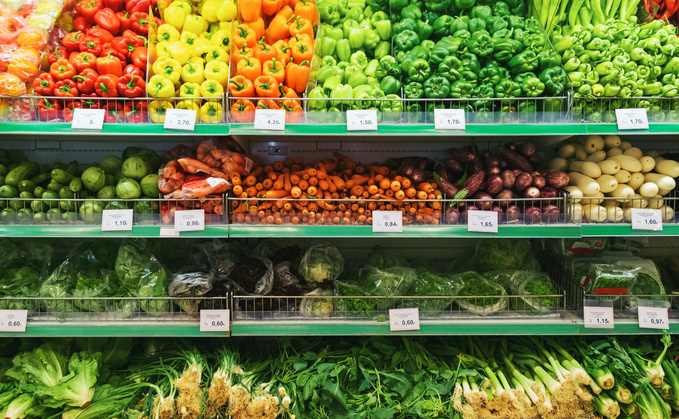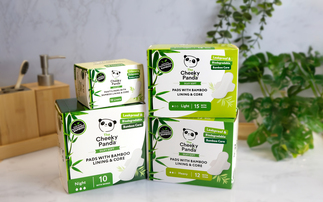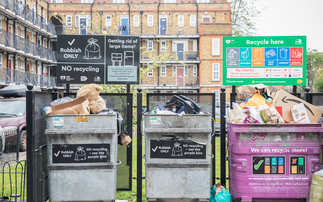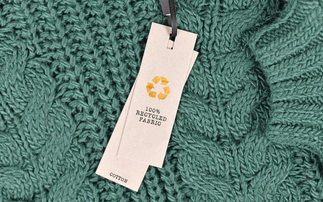
Industry Voice: Dow's Angels Domenech explains how innovative plastic packaging and recycling processes can drive down food waste, plastic waste and emissions
I consider myself fortunate that I am able to go to the supermarket and still fill my basket with the food I need and enjoy. Headlines have, until recently, focused on food waste rather than food shortages.
However, the United Nations Secretary General, António Guterres, recently warned that shortages of grain and fertiliser caused by war, warming temperatures and pandemic-driven supply problems, threaten to tip tens of millions of people over the edge into food insecurity and this could last for years if it goes unchecked.
When global food supply chains are threatened, each stage of the chain and the technologies involved are propelled into focus and action. For me, food security is something I've had to carefully consider throughout my career at Dow. As a seasoned innovator in the plastics and packaging industry, we have been at the forefront of driving material discovery and technologies that enable us to prolong the longevity of food and find ways to efficiently support global food supply chains to reach the mouths they feed across the world.
How does Dow support the global supply chain for food?
Dow products and technologies support the food packaging industry, including meat and cheese, fruit and vegetables, snacks and cereals, coffee and confectionery, and even pet food.
For years, Dow has been working to deliver quality products for the end consumer with proven ingredients. We have been innovating to create unique, high-performance food packaging that helps preserve food flavour and quality, protect food against spoilage and ensure safety and freshness, security and sustainability for consumers around the world. In fact, well-designed innovative food packaging can help:
- Protect foods delivered over longer distances for grocery retailer online sales and food subscription boxes from damage while reducing transportation weight and bulk
- Reduce food waste by extending the distribution- and shelf-life of food and avoid premature spoilage
- Allow for fewer preservatives, additives and saturated fats through improved seals and barrier layers
One of Dow's purpose-built sites in Spain, Pack Studios Tarragona, is where these designs are brought to life. We take a collaborative approach to accelerating sustainable packaging innovations, engaging with packaging experts across the value chain to create food packaging with freshness, safety, and sustainability front of mind.
What role do plastics play in ensuring food reaches people across the world?
The global trend toward healthier diets is causing a greater demand for fresh produce. But shockingly, 45 per cent of all fruits and vegetables produced are wasted. While it might seem to some that the plastic packaging of individually wrapped cucumbers is wasteful, in fact, this plastic wrapping can nearly triple the amount of time the vegetable stays fresh. For example, a cucumber wrapped in plastic can stay fresh for up to 14 days, while an unwrapped cucumber stays fresh for about five days, meaning it will more likely make it to markets to be sold and eaten, rather than spoiled and wasted.
Our technologies are also supporting longevity at earlier stages in the supply chain. Take agriculture for example: in Kenya, we've introduced Mama Silage Bags - innovative storage bags using a unique multilayer film structure that is designed to help improve feed storage and reduce waste. By enabling Kenyan farmers to better preserve animal feed for dairy cows, it helps to provide a steady supply of milk, which is integral for supply chains in countries such as Kenya where 80 per cent of the milk produced comes from smallholder dairy farmers.
Plastic packaging doesn't only extend the shelf life of fresh produce, it can also help retain its nutritional value. For example, broccoli can lose up to 80 per cent of its glucosinolates, a group of phytochemicals thought to be responsible for some of the crop's key health benefits, when unpackaged on supermarket shelves, versus plastic wrapped.
Can plastic packaging really help to reduce greenhouse gas emissions?
The UN found that an estimated 931 million tonnes of food, or 17 per cent of total food available to consumers in 2019 went to waste.
Reducing food waste can help to cut greenhouse gas emissions, with an estimated 8-10 per cent of global greenhouse gas emissions associated with food that is not consumed. In fact, the World Economic Forum suggests that about 6-8 per cent of all human-caused greenhouse gas emissions could be reduced if we stop wasting food. If we were to remove all packaging from food, much of the time, the crop would go off before being eaten and food waste would soar. A key benefit of plastic packaging is its ability to protect food during transport, meaning it makes it to consumers without being damaged or spoiled in transition so less is wasted.
Flexible packaging, including films, wraps and pouches which we see used in food packaging, provide more efficient transportation as compared to rigid containers (things like plastic bottles and jars). This means when it comes to transporting items across supply chains, greater volumes of flexible packaging can be packed into vehicles for transportation. And there are significant carbon savings associated with being able to transport a greater amount per vehicle.
Comparing the performance and sustainability of plastic packaging with other materials can often provide a more complex decision than you might imagine. Take glass for example, the greatest benefit is that it is endlessly recyclable, back to its original use. However, it is far more energy-intensive to produce than plastic - it takes twice as much energy to produce - and due to its exponentially higher weight, more carbon-intensive to transport across the supply chain. Plastic on the other hand, although less likely to be recycled at present, it is far less carbon-intensive to produce.
Ensuring a sustainable future, without comprising on performance
Of course, that's not to say that plastic packaging is the solution to food supply issues, overuse of packaging is a problem that must be addressed - that is, the use of excessive packaging. The challenge is to use the right amount of plastic packaging that provides functionality with the least resources possible, while ensuring it is fully recyclable after use.
There is no doubt that reducing the amount of plastic we use is integral to a more sustainable future, and ensuring that the plastic we do use, is kept within a circular economy. This is central to Dow's strategy moving forwards - we're investing in breakthrough sustainability innovations to make plastic packaging more easily recyclable right from the design. We're also investing in a number of innovative recycling technologies that will transform the recycling process, and one day enable us to recycle all plastics, infinitely.
In 2021, we announced our collaboration with Bolloré on a pilot project which enables the use of recycled content in new food-contact packaging applications which can in turn be recycled after use. We are also partnered with Mura Technology, to scale a chemical recycling technology that enables all forms of plastics to be recycled, including multi-layer, flexible plastics often used in food packaging. This is incredibly exciting territory, as typically packaging used for food applications is not easily recyclable due to regulatory compliance needs. But finding and scaling novel solutions here will enable us to accelerate our mission to close the loop and progress a circular, net zero plastics industry.
Looking to the future…
We are innovators for a circular and sustainable future, driving the transition from a linear economy to one that reduces, reuses, and recycles to keep materials at their highest value use for as long as possible. By 2030, Dow will help "stop the waste" by enabling one million metric tons of plastic to be collected, reused or recycled. And by 2035, Dow will "close the loop" by enabling 100 per cent of Dow products sold into packaging applications to be reusable or recyclable.
An uninterrupted supply and abundant choice of food is often taken for granted in developed countries, and only when the supply is threatened do we remember how precious it really is. Tackling the issue of global food security is of course a monumental challenge that requires the international cooperation of governments, NGOs, and the private sector alike. And while plastic packaging is not the answer to all our food needs, when used effectively, it plays a critical role in supporting our global food supply chains. I'm excited about the challenge in front of us - that is to continue to innovate polymers with purpose so we can progress towards a circular and net-zero economy in which we recycle all food packaging.
Angels Domenech is EMEA technical service and development director at Dow.
This article is sponsored by Dow.







